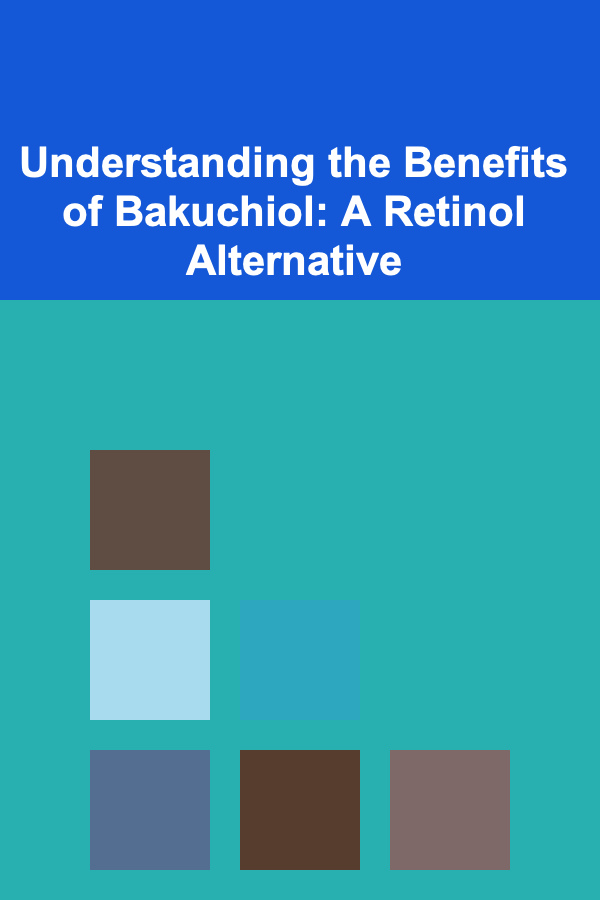
Understanding the Benefits of Bakuchiol: A Retinol Alternative
ebook include PDF & Audio bundle (Micro Guide)
$12.99$8.99
Limited Time Offer! Order within the next:

For decades, retinol has been hailed as a skincare superstar, celebrated for its ability to combat aging signs, acne, and hyperpigmentation. However, retinol isn't without its drawbacks. Its potential for irritation, dryness, and sun sensitivity makes it unsuitable for everyone, particularly those with sensitive skin or certain skin conditions. This has led to a fervent search for effective alternatives, and one such alternative has emerged as a promising contender: bakuchiol.
This comprehensive exploration delves into the world of bakuchiol, a plant-derived compound gaining significant traction in the skincare industry. We will unpack its origins, mechanism of action, benefits, and how it compares to retinol, providing you with the knowledge needed to understand if bakuchiol is the right choice for your skincare needs.
What is Bakuchiol?
Bakuchiol is a meroterpene phenol found predominantly in the seeds and leaves of the Psoralea corylifolia plant, also known as Babchi. This plant has a long history of use in traditional Ayurvedic and Chinese medicine, where it has been utilized for its anti-inflammatory, antibacterial, and antioxidant properties. While traditional uses primarily focused on treating skin diseases, modern science has begun to unravel the specific benefits of bakuchiol for cosmetic applications.
Unlike retinol, which is a form of vitamin A, bakuchiol possesses a distinct chemical structure. Despite the structural differences, research has shown that bakuchiol can exert similar effects on the skin, particularly in terms of collagen stimulation and reduction of aging signs, without the same level of harsh side effects associated with retinoids.
How Does Bakuchiol Work? Unveiling the Mechanism of Action
The mechanism by which bakuchiol exerts its effects is still being researched, but accumulating evidence suggests a multifaceted approach. While not structurally related to retinoids, bakuchiol interacts with similar pathways within skin cells, offering comparable benefits but through distinct molecular mechanisms. Here's a breakdown of the key areas of impact:
1. Retinoid Receptor Binding and Gene Expression
One of the key actions of retinoids is their ability to bind to retinoid receptors within skin cells. These receptors then influence gene expression, leading to increased collagen production, enhanced cell turnover, and improved skin elasticity. Studies have demonstrated that bakuchiol can also bind to retinoid receptors, albeit with a different binding affinity than retinol. This binding influences similar genetic pathways, promoting collagen synthesis and reducing the appearance of wrinkles and fine lines. The difference in binding affinity is believed to contribute to bakuchiol's milder side effect profile.
2. Collagen Stimulation
Collagen, the primary structural protein in the skin, is essential for maintaining firmness and elasticity. As we age, collagen production naturally declines, leading to the formation of wrinkles and sagging skin. Bakuchiol has been shown to stimulate collagen production in fibroblasts, the cells responsible for synthesizing collagen. This increased collagen synthesis contributes to a more youthful and plump appearance of the skin.
3. Antioxidant Properties
Oxidative stress, caused by free radicals, is a major contributor to skin aging. Free radicals damage collagen and elastin fibers, leading to wrinkles, hyperpigmentation, and other signs of aging. Bakuchiol is a potent antioxidant, capable of neutralizing free radicals and protecting the skin from oxidative damage. This antioxidant activity helps to prevent premature aging and maintain skin health.
4. Anti-Inflammatory Effects
Inflammation plays a significant role in various skin conditions, including acne, rosacea, and eczema. Chronic inflammation can also accelerate skin aging. Bakuchiol possesses anti-inflammatory properties that help to soothe and calm irritated skin. By reducing inflammation, bakuchiol can help to improve the overall health and appearance of the skin, making it beneficial for individuals with sensitive or reactive skin.
5. Inhibition of Melanin Production
Hyperpigmentation, such as sunspots and melasma, is caused by an overproduction of melanin. Bakuchiol has demonstrated the ability to inhibit melanin production, helping to reduce the appearance of hyperpigmentation and even out skin tone. This makes bakuchiol a valuable ingredient for addressing concerns related to uneven skin pigmentation.
The Benefits of Bakuchiol: What Can It Do For Your Skin?
Based on the mechanisms of action described above, bakuchiol offers a range of benefits for the skin, making it a compelling alternative to retinol. Here's a more detailed look at the specific benefits:
1. Reduction of Fine Lines and Wrinkles
The ability of bakuchiol to stimulate collagen production and protect against oxidative stress makes it effective in reducing the appearance of fine lines and wrinkles. Clinical studies have demonstrated that bakuchiol can significantly improve skin elasticity and firmness, resulting in a more youthful complexion. Unlike retinol, bakuchiol is less likely to cause dryness or irritation, making it a more comfortable option for long-term use in anti-aging regimens.
2. Improved Skin Elasticity and Firmness
By boosting collagen synthesis, bakuchiol helps to improve skin elasticity and firmness. This leads to a reduction in sagging skin and a more toned appearance. The enhanced structural support provided by increased collagen levels contributes to a more resilient and youthful skin texture.
3. Even Skin Tone and Reduced Hyperpigmentation
Bakuchiol's ability to inhibit melanin production makes it effective in addressing hyperpigmentation, such as sunspots, age spots, and melasma. Regular use of bakuchiol can help to even out skin tone and reduce the appearance of dark spots, resulting in a brighter and more radiant complexion. Its anti-inflammatory properties also help to reduce post-inflammatory hyperpigmentation (PIH) associated with acne and other skin conditions.
4. Acne Treatment and Prevention
While not as potent as some dedicated acne treatments, bakuchiol can play a role in managing acne due to its anti-inflammatory and antibacterial properties. By reducing inflammation, it can help to calm acne breakouts and prevent future blemishes. Additionally, its ability to regulate sebum production can help to minimize clogged pores, a major contributing factor to acne formation. Its gentler nature compared to retinol makes it suitable for individuals with acne-prone and sensitive skin.
5. Soothing and Calming Irritated Skin
The anti-inflammatory properties of bakuchiol make it beneficial for soothing and calming irritated skin. It can help to alleviate redness, itching, and inflammation associated with conditions such as eczema, rosacea, and psoriasis. Bakuchiol can be incorporated into skincare routines to provide relief from skin sensitivity and promote a healthier skin barrier function.
6. Protection Against Environmental Damage
As a potent antioxidant, bakuchiol helps to protect the skin against environmental damage caused by free radicals. This includes damage from UV radiation, pollution, and other environmental stressors. By neutralizing free radicals, bakuchiol helps to prevent premature aging and maintain skin health. Incorporating bakuchiol into your daily skincare routine can provide an extra layer of protection against environmental aggressors.
Bakuchiol vs. Retinol: A Detailed Comparison
While bakuchiol offers many of the same benefits as retinol, there are key differences between the two that are important to consider when choosing the right ingredient for your skincare needs. Here's a comprehensive comparison:
1. Chemical Structure and Origin
- Bakuchiol: A natural compound derived from the Psoralea corylifolia plant. It is a meroterpene phenol with a distinct chemical structure.
- Retinol: A form of vitamin A, a retinoid. It is typically synthesized or derived from animal sources, although vegan forms are available.
2. Mechanism of Action
- Bakuchiol: Binds to retinoid receptors and influences similar genetic pathways, promoting collagen synthesis, reducing inflammation, and inhibiting melanin production. It achieves similar effects to retinol but through different molecular mechanisms.
- Retinol: Binds directly to retinoid receptors, strongly influencing gene expression related to cell turnover, collagen production, and sebum regulation. It is a more potent activator of retinoid receptors.
3. Efficacy
- Bakuchiol: Clinically proven to provide similar benefits to retinol in terms of reducing wrinkles, improving skin elasticity, and evening skin tone. While potentially less potent than high-concentration retinol, studies show comparable results with good tolerability.
- Retinol: Highly effective in treating aging signs, acne, and hyperpigmentation. It is considered the gold standard ingredient for these concerns but often comes with significant side effects.
4. Side Effects
- Bakuchiol: Generally well-tolerated, even by individuals with sensitive skin. Less likely to cause dryness, redness, peeling, or sun sensitivity. Considered a gentler alternative to retinol.
- Retinol: Commonly associated with side effects such as dryness, redness, peeling, irritation, and increased sun sensitivity. Requires careful introduction and gradual increase in concentration.
5. Sun Sensitivity
- Bakuchiol: Does not typically increase sun sensitivity. While sunscreen is always recommended, bakuchiol can be used during the day without significantly raising the risk of sun damage.
- Retinol: Increases sun sensitivity significantly. Sunscreen is essential when using retinol, and it is often recommended to use it only at night.
6. Pregnancy and Breastfeeding
- Bakuchiol: Considered safer to use during pregnancy and breastfeeding compared to retinol, although consulting with a healthcare professional is always recommended. Limited research exists, but its gentler nature makes it a more favorable option.
- Retinol: Contraindicated during pregnancy and breastfeeding due to the potential for birth defects.
7. Stability
- Bakuchiol: Relatively stable in skincare formulations and less prone to degradation from light and air compared to some forms of retinol.
- Retinol: Can be unstable and sensitive to light and air. Requires careful formulation and packaging to maintain its efficacy.
8. Suitability
- Bakuchiol: Suitable for all skin types, including sensitive, dry, and acne-prone skin. An excellent choice for individuals who cannot tolerate retinol or are looking for a gentler anti-aging option.
- Retinol: Best suited for individuals with resilient skin who are looking for powerful anti-aging or acne-fighting benefits and are willing to tolerate potential side effects. Requires careful monitoring and adjustment of usage.
In summary, bakuchiol offers a compelling alternative to retinol for those seeking anti-aging and skin-enhancing benefits without the harsh side effects. While retinol remains a potent ingredient, bakuchiol's gentler nature, improved tolerability, and suitability for sensitive skin make it an attractive option for a wider range of individuals.
How to Incorporate Bakuchiol into Your Skincare Routine
Adding bakuchiol to your skincare routine is relatively straightforward. Here are some tips to ensure you get the most out of this ingredient:
1. Choose the Right Product
Bakuchiol is available in various skincare products, including serums, creams, lotions, and oils. Choose a product that aligns with your skin type and preferences. Serums are often a popular choice due to their concentrated formula and ability to penetrate deeply into the skin. Look for products that contain a sufficient concentration of bakuchiol (typically 0.5% to 1%) to ensure optimal efficacy. Check the ingredient list for other beneficial ingredients, such as antioxidants, hydrating agents, and soothing extracts, that can complement the effects of bakuchiol.
2. Start Slowly and Patch Test
Even though bakuchiol is generally well-tolerated, it's always a good idea to start slowly and perform a patch test before incorporating it into your entire skincare routine. Apply a small amount of the product to a discreet area of your skin (such as the inside of your wrist or behind your ear) and observe for any signs of irritation, redness, or allergic reaction over a 24-48 hour period. If no adverse reactions occur, you can proceed to use the product as directed.
3. Application Frequency
Most bakuchiol products can be used once or twice daily, depending on your skin's tolerance. If you are new to bakuchiol, start with once-daily application, preferably at night, and gradually increase the frequency as your skin adapts. Pay attention to how your skin responds and adjust the frequency accordingly. If you experience any dryness or irritation, reduce the frequency of application or use a moisturizer to hydrate your skin.
4. Layering with Other Skincare Products
Bakuchiol can be easily incorporated into your existing skincare routine. Apply it after cleansing and toning, and before heavier creams or oils. It can be used alongside other active ingredients, such as vitamin C, hyaluronic acid, and peptides. However, avoid using bakuchiol concurrently with retinol, as this may increase the risk of irritation. If you are currently using retinol, gradually phase it out as you introduce bakuchiol into your routine.
5. Sunscreen is Still Essential
While bakuchiol doesn't increase sun sensitivity as significantly as retinol, sunscreen is still an essential part of any skincare routine. Apply a broad-spectrum sunscreen with an SPF of 30 or higher every morning to protect your skin from UV damage. This will help to prevent premature aging, hyperpigmentation, and other sun-related skin concerns. Reapply sunscreen every two hours, especially if you are spending time outdoors.
6. Consistency is Key
Like any skincare ingredient, consistency is key to seeing noticeable results with bakuchiol. Use it regularly as part of your daily routine for at least several weeks to allow your skin to adapt and experience the full benefits. Be patient and persistent, and track your progress over time. You may start to see improvements in skin texture, tone, and firmness within a few weeks, with more significant results appearing after several months of consistent use.
Potential Side Effects and Precautions
While bakuchiol is generally well-tolerated, it's important to be aware of potential side effects and take necessary precautions:
1. Allergic Reactions
Although rare, allergic reactions to bakuchiol are possible. If you experience any signs of an allergic reaction, such as hives, itching, swelling, or difficulty breathing, discontinue use immediately and seek medical attention.
2. Mild Irritation
In some cases, bakuchiol may cause mild irritation, such as redness, dryness, or peeling. This is more likely to occur if you have sensitive skin or are using a product with a high concentration of bakuchiol. If you experience mild irritation, reduce the frequency of application or use a moisturizer to soothe your skin.
3. Pregnancy and Breastfeeding
While bakuchiol is generally considered safer than retinol during pregnancy and breastfeeding, it's always best to consult with a healthcare professional before using it. Limited research exists on the safety of bakuchiol during pregnancy and breastfeeding, so it's important to weigh the potential benefits against the potential risks.
4. Drug Interactions
Bakuchiol may interact with certain medications. If you are taking any medications, especially those that affect the liver, consult with your doctor before using bakuchiol.
Conclusion: Is Bakuchiol Right For You?
Bakuchiol has emerged as a compelling and promising alternative to retinol, offering similar anti-aging and skin-enhancing benefits with a significantly reduced risk of side effects. Its natural origin, antioxidant properties, and compatibility with sensitive skin make it an attractive option for a wide range of individuals. Whether you are unable to tolerate retinol, seeking a gentler anti-aging solution, or simply looking to incorporate a new and effective ingredient into your skincare routine, bakuchiol is worth considering.
By understanding the mechanisms of action, benefits, and potential side effects of bakuchiol, you can make an informed decision about whether it's the right choice for your skin. Remember to choose high-quality products, start slowly, and be consistent with your application. With proper care and attention, bakuchiol can help you achieve a healthier, more youthful, and radiant complexion.
Reading More From Our Other Websites
- [Personal Investment 101] 10 Ways to Make Money Using Deep Learning
- [Organization Tip 101] How to Organize Your Garage with DIY Projects
- [Home Cleaning 101] How to Clean Your Patio: Essential Outdoor Cleaning Tips for a Spotless Deck and Entertainment Area
- [Personal Care Tips 101] How to Use Makeup Remover Oil for Deep Cleansing
- [Personal Financial Planning 101] How to Maximize Your Retirement Savings: Understanding Roth IRA vs. Traditional IRA Contributions
- [Home Space Saving 101] How to Declutter Your Home and Save Space with Effective Organization
- [Personal Care Tips 101] How to Boost the Effectiveness of Acne Treatment Cream with Proper Skin Care
- [Mindful Eating Tip 101] From Sugar Rush to Calm: Practicing Mindful Eating to Cut Hidden Sugars
- [Rock Climbing Tip 101] Maintenance Tips: Keeping Your Climbing Accessories in Peak Condition
- [Home Holiday Decoration 101] How to Use Ribbon for Christmas Tree Decorations to Add Elegance and Charm

10 Clever Tips for Saving Money on Pet Food and Supplies
Read More
How to Create a Checklist for Using Editing Software for Product Photography
Read More
How to Create Stunning Greeting Card Designs with Simple Tools
Read More
How to Organize and Clean Your Home Office for Productivity
Read More
Top Tips for Saving Money on Home Meal Delivery Services
Read More
How to Edit Photos for Print vs. Digital
Read MoreOther Products

10 Clever Tips for Saving Money on Pet Food and Supplies
Read More
How to Create a Checklist for Using Editing Software for Product Photography
Read More
How to Create Stunning Greeting Card Designs with Simple Tools
Read More
How to Organize and Clean Your Home Office for Productivity
Read More
Top Tips for Saving Money on Home Meal Delivery Services
Read More